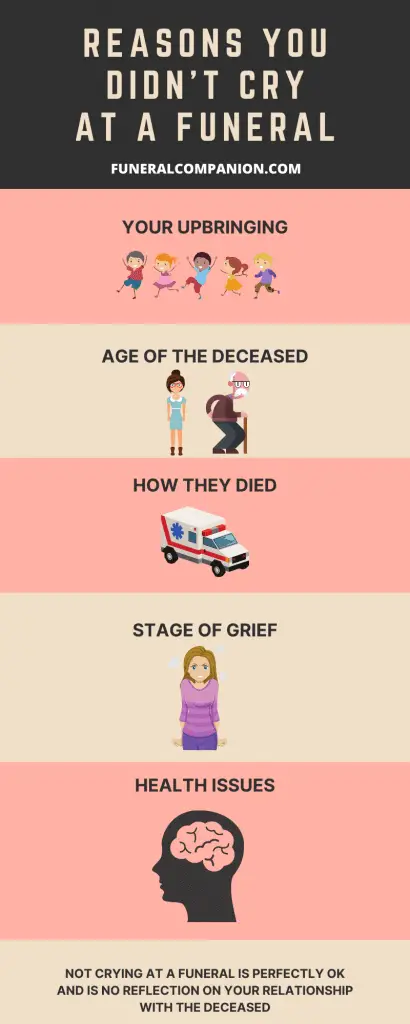Tears at a funeral are a common image in movies and books. In days gone by people hired professional mourners to cry over their graveside, but does that mean that a dried-eyed funeral guest is strange?
Not crying at a funeral, even for a close relative, is no reflection on your relationship with the deceased and isn’t a cause for concern. Research suggests that the shock of death can render our sense dumb, which could lead to no obvious outside remorse at a funeral. Everyone reacts differently.
Nevertheless, crying isn’t only about outward appearance and there is more to learn about this phenomenon.
So, if you want to discover more about why you didn’t cry at a funeral when you thought you should, please read on.

Why didn’t you cry at that funeral?
There are many reasons why you may not have cried at someone’s funeral and they are not all connected to you as a person nor are they connected to who died. Grief (Speak to a professional today from the comfort of your home) comes in many different forms and not all passings are taken in the same way.
So, let’s run through a few reasons for no tears at a funeral.

Upbringing
For most of us, we only attend one or two funerals before adulthood so they are uncharted territory. We may expect to ball our eyes out, but when it comes to the fact, we just don’t.
This is often connected to our upbringing.
Some children are taught that it’s not ok to cry, especially boys. This can be done in two ways, A) children are punished for crying and B) children aren’t exposed to people crying or showing true emotions publically.
Those types of lessons stick, and even when a very close friend or relative dies, we revert back to what we observed as kids and we just don’t cry.
Age of the deceased
I have to admit that when my grandparents died, within two weeks of each other, I didn’t cry at their funerals. I had grown up with my parents being 10 minutes around the corner and they died when I was in my mid-thirties. They were obviously very important people in my life.
However, they both lived to a ripe old age and died at 94 and 95 years of age. It was expected and their passing was peaceful in both cases.
My grandparents had travelled the world, had successful careers, raise children and grandchildren and were active and happy until the day they died. Something we could all aspire to.
Although sad, their passing was neither a shock nor particularly devasting. Attending their funeral was a celebration of their life for the family, which actually led to smiles rather than tears.
Circumstances of death
As I mentioned before, my grandparents died peacefully in their sleep without a prolonged struggle with illness. This makes it much easier on those left behind.
When you lose someone dear to you and it happens in a sudden and even violent manner, your mind may not be able to catch up. You may not cry at the funeral in these circumstances because you are feeling another strong emotion, such as anger, or you are just in shock and denial.
Often in these circumstances, it can take quite a long time for the dust to settle and for you to finally realize the full extent of what has happened. So, tears may still come in the future when you’ve had the time to process what has truly happened.
Stage of grief
Grief is different for everyone and affects us all in different ways. In fact, it is now generally believed that there are 5 stages to grief, which was made popular by the work of Elisabeth Kübler-Ross.
They are:
- denial
- anger
- bargaining
- depression
- acceptance
What this means is that during the different stages of grief you are actually going through a number of different emotions and reactions to the death, so crying may not be an automatic result.
If the funeral occurs during the early stages of grief, then you may feel more like shouting than crying. So, this means that in time the tears are more likely to come.
Timing
It is possible that you didn’t cry on the actual day of the funeral because you had simply run out of tears. Apparently, we do have a finite amount of liquid used by the eye for its own lubrication and tears.
If you had been crying heavily for days before the funeral, it’s possible that you had literally dried out.
Physiological issues
Sometimes a lack of tears can be a medical issues and beyond your control.
Keratoconjunctivitis sicca and Sjögren’s syndrome are two possible reasons for not being able to cry. If you’ve noticed that you don’t cry now when you normally would have, you should visit your doctor.
Psychological condition
Not crying at a funeral could also be connected to your mental health. Psychotherapist Annie Wright, LMFT, says that depression can dull many of our emotions, especially ones that make us cry.
Although you may think that depressed people are more susceptible to crying than others, a Stanford study disputes this notion. Depressed people can sometimes feel intensely sad but not shed a tear.
Of course, depression is a recognized step in the grieving process and we should all expect to experience it, even if just a short period. If you have any concerns over your mental health, then visit your doctor for advice.
Is crying important for the grieving process?
Many people find crying an intensely cathartic ritual when it comes to grieving, but it is by no means essential in the process. The most important thing is to express your emotions in some way and not to bottle them up. This can lead to serious behavioral and mental health issues in the future.
As we have discussed already in this article, grief hits us all in different ways. Crying may be the automatic reaction of some people why they navigate the 5 steps of grieving before finally reaching acceptance and hope.
If you don’t need to cry to achieve this, then that’s absolutely fine. However, there are real physiological dangers associated with wanting to cry but not being able to do so.
If you have been isolating yourself or don’t find joy in the things you once did, you could be in deep depression. In this case, I’d strongly urge you to contact a grief counselor (link to online counselor service).
Is it wrong for men to cry at funerals?
There is nothing wrong with crying at a funeral as a man. if you feel like doing it, don’t hold back. However, as a society men are told that crying is not a masculine act and this can influence them even during extreme grief.
Whether you will have any fallout from crying at a funeral really depends on your culture and even your family. Some people are brought up to present a dignified facade to the world, even during tragic moments. Some cultures teach their male folk not to do anything which is traditionally associated with women, from chores to emotions.
For me personally, I would say act the way you see fit and don’t be ashamed of tears shed for the love of a great man or woman who is no longer with us.





